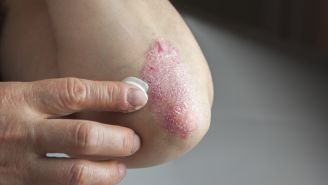Updated on September 10, 2024.
About three percent of people in the United States are affected by psoriasis. This skin condition can cause a variety of symptoms, including:
- Inflamed skin
- Thickened nails with ridges and pits
- Areas of skin that are thicker, with silver-white scales on the elbows and knees, palms and soles of feet, the scalp, and the abdomen
In plaque psoriasis, the most common form, these scales (or “plaques”) can appear at any time and can itch or cause a burning sensation. And while there’s no cure, there are treatments that can help control it and prevent flare-ups.
Sometimes, psoriasis can take a more severe and serious form, called erythrodermic psoriasis. Understanding the different forms of this autoimmune condition is important for identifying more serious disease that may need immediate medical attention.
Types of psoriasis
There are many types of psoriasis. Four of the most common varieties are:
- Plaque psoriasis: Between 80 and 90 percent of people who have psoriasis have this form. Symptoms include patches of raised, inflamed skin covered in scales, or plaques. These usually occur symmetrically on the body.
- Guttate psoriasis: Generally younger people and children experience this type, and it looks a bit different. Instead of scales, it shows up as small red dots on the arms, legs, or torso, which might be triggered by an infection like strep throat (which can also trigger plaque psoriasis).
- Pustular psoriasis: Bumps filled with pus (called pustules) and red skin on the hands and feet mark this type. Triggers can include anything from stress to medications or infections.
- Inverse psoriasis: Thin plaques that don’t have scales show up in this type, usually in the folds of the skin, such as where the underside of the breasts meet the chest, or in the armpits or groin area.
Erythrodermic psoriasis is a much rarer type. While it can occur in someone without psoriasis, one in three people with this severe type already had plaque psoriasis, according to the Cleveland Clinic. Only about three percent of people with psoriasis will be affected by this type.
Someone with this type will develop scaly, red, itchy plaques over most of the body, instead of just patches on certain parts of the body. Up to 90 percent of the body, head to toe, can be covered. The skin and nails may peel or shed.
Causes and triggers of erythrodermic psoriasis
Researchers aren't sure what exactly causes erythrodermic psoriasis, but there are some common triggers. These include:
- Suddenly stopping a psoriasis treatment medication, especially corticosteroids or immunosuppressants
- Allergic reactions to medicine
- Using some medications more than prescribed, including topical steroids or retinoids
- Severe sunburns
- Infections or serious illness
- Stress
- Substance use disorder
Symptoms
Once triggered, erythrodermic psoriasis might develop very quickly over a few days, or it might grow out of an existing psoriasis flare-up and take months to become a life-threatening body-wide skin inflammation.
The American Academy of Dermatology notes that in people who already have psoriasis, one sign that they may be developing the erythrodermic type is that their psoriasis is getting worse, or their treatments no longer helping.
The following are symptoms of erythrodermic psoriasis:
- Fiery redness that covers most of the body
- Dry, warm skin
- Intensely itchy, painful skin
- Skin shedding in large sheets
- Joint pain
Other signs include:
- Swollen ankles
- Quick heartbeat
- Shivering and chills
- Night sweats
If you notice these symptoms, go to an emergency room right away. To reach a diagnosis, they will ask questions about your medical history, examine your skin, and possibly do lab tests.
Potential complications
Erythrodermic psoriasis causes skin to look like it’s been burned. It also acts like burned skin, causing dehydration, fever, and chills. It may make it harder for you to sweat or maintain a healthy body temperature.
And aside from being extremely uncomfortable, erythrodermic psoriasis has serious implications for your health. It can increase your risk for pneumonia and heart failure and can even lead to sepsis. This complication can become deadly if not treated quickly and correctly.
Diagnosis
A dermatologist or other healthcare provider (HCP) will be able to diagnose the condition, based on symptoms. They may also perform a biopsy of your skin to be certain of the diagnosis.
Treatment and prevention
After diagnosis, the HCP will develop a fast-acting treatment plan, which may include:
- Moisturizers
- Skin creams that are medicated or contain corticosteroids or retinoids
- Retinoids that can be taken by mouth
- Nonsteroidal anti-inflammatory drugs (NSAIDs)
- Immunosuppressant drugs, like methotrexate
- Disease-modifying antirheumatic drugs (DMARDs)
- Biologic drugs
Be sure to stay away from treatments that can make your erythrodermic psoriasis even worse, unless a dermatologist specifically advises them. These include systemic corticosteroids that go throughout your body in your blood, any light therapy, and products made from coal tar.
To prevent future flare-ups of erythrodermic psoriasis, make sure to see a dermatologist regularly, and follow their treatment recommendations. If you smoke, quitting will prevent flare-ups. Avoiding secondhand smoke, alcohol, too much sun, and managing stress can all help.
If you have plaque psoriasis, talk with your HCP about how you can get the most benefit from your treatment, and decrease your risk for this serious condition.







